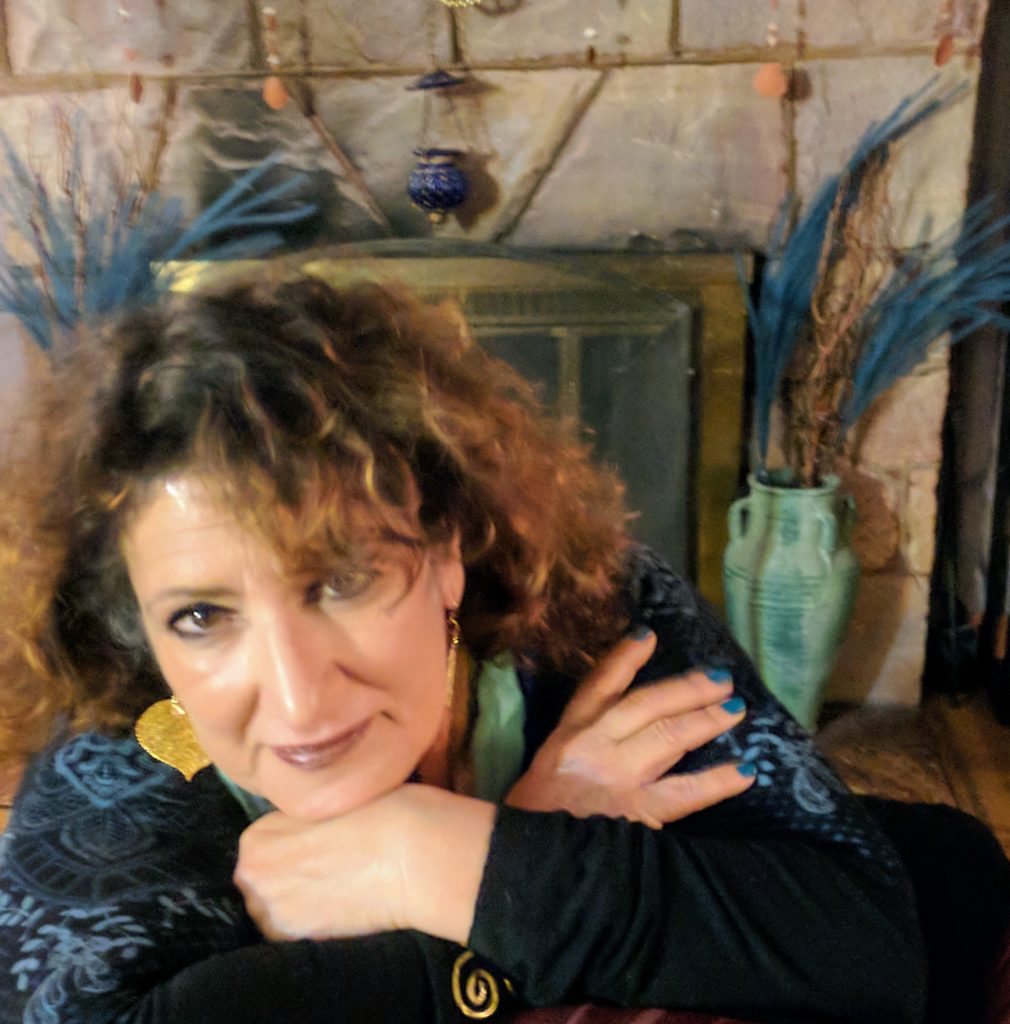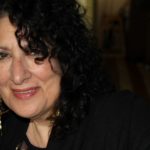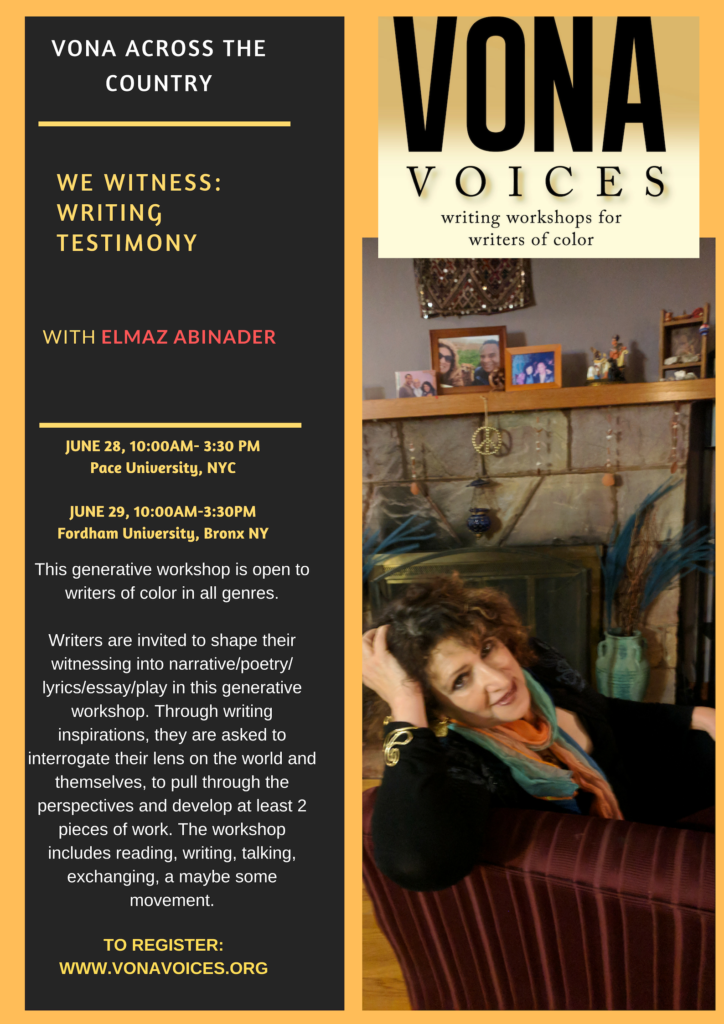
Mi Gente! Welcome to our Spring Interview Series! Super excited to share with you my conversations with Creatives and Entrepreneurs I admire and been blessed and privilege to work with.
Today, I have the absolute honor to share my conversation with Elmaz Abinader, author and performer, Co-founder and former Program Director of VONA (Voices of Our Nations and Arts Foundation), the only multi-genre workshop for writers-of-color in the U.S.As a VONA alum myself, I had the privilege to work with Elmaz as one of her alums in the Political Content workshop for VONA’s 2016 Summer Program at the University of Miami. Every VONA alum has been touched by her magic whether as her alum or as a VONA participant.
I met Elmaz a year before I considered applying to VONA. As always, her smile lights up a room and her warmth welcomes you and makes you feel at home. After meeting her and listening to her powerful poetry and enthusiasm about the mission of VONA, I applied and I was accepted.
On my first day of class, still not feeling like my story or I belonged in a place like VONA, I was sobbing during our introductions. Yet, Elmaz quickly reminded me that I was in the right space because I mattered and my story mattered. She said, “I want you to know, that your application was the first one I read and I immediately knew you had to be here.” Those words have stayed with me and every time I feel unsure of my purpose as a writer, I remember them and of course, Elmaz.
Not only did she blessed me with one of the most powerful workshops that as a writer I’ve taken (what I learned that Summer changed me ), but also with the opportunity to work with VONA and take over her role as Program Director. She prepared me for two months and has become a priceless mentor. Her commitment to writing and more so to amplifying the voices of writers-of-color is what I admire most about her.
So without further introduction….Elmaz Abinader
Tell us about yourself, who is Elmaz, where were you born?
I was born listening. Listening to two languages, to the voices inside our home, a strongly Leb home, and outside our home, the small coal mining town in the southwest corner of Pennsylvania on the West Virginia border. The fifth of six children, middle daughter, I was raised in a house that was loud: a racket of voices, and song, and scoldings. God was number one, family was number two, and education was number three. I was bad at all of them, and so I listened more than I spoke.
When did you claim yourself a Writer?
Poetry is a natural part of Arabic. You call your loved one, ya rouhy, my spirit, ya einy, my eyes. Metaphor makes our expressions limitless. We write poems and sing songs for everything: birthdays, graduations. The zajal, meaning “shout” is an ancient Arabic poetry competition where poets try to out-rhyme, out-spit each other. We invented the slam. So everyone I knew wrote poetry, everyone in my family recited poetry. But I was the only one who followed the words, was pulled to center them in my life. Particularly after I hated the pre-law classes in college and loved only the writing and film classes. My writing teachers encouraged me and that affirmation allowed me to go forward.
What /who inspires you to write?
The battleground of perception compelled me to write. In my lifetime, from the Six-day War in 1967 between Israel and Arab countries through this presidency, the broad view of Arabs didn’t track with family, friends, communities I knew. In the tradition of storytelling, my poetry, fiction, non-fiction, and plays get particular, illustrating the individual, the home, the relationships and the reality of how we connect with others in the world.
As an Arab-American, in your writing, have you felt like you have had to choose between one culture and the other?
Arab-American is a culture– the binary of their being an American culture and, an Arab culture and I’m somehow an amalgam of both or holding space between doesn’t ring true. I am Arab-American who aligns with some other Arab-Americans and other POC’s who make art, who are politically progressive, who are obsessed with justice and compassion. That’s my culture and my community.
How is your art an act of defiance?
My art may defy, may disrupt, but what I hope it does is complicate. That means that the dominant culture feels invited rather than repelled. That my voice expands and particularizes stories and lives rather than just says “see it my way.” It’s true that I want to attack and rebel, but the act of art is a movement to the internal shift. Not just through the information I give, my perceptions I change, also through the use of language, the forms I create, the music I play with the notes of words.
As a Woman of Color who’s also a writer what are some of the issues, you have had to confront and overcome? Has it changed from when you first started?
When I first started writing and publishing, American literary institutions had so much trouble even looking at writing from Arab-Americans that wasn’t political analysis or cookbooks. So much POC writing was overlooked, or someone became the “poster writer” for their particular cultural category (as seen by the institution). If Toni Morrison hadn’t given me the opportunity to write my first book under her guidance as one of the first two Schweitzer Post-Doctoral Fellows in the Humanities, no one would have considered Children of the Roojme, my first memoir. She also empowered me to push through barriers and the boring expectations, the overused and cliché tropes expected of Arab-American writers.
I am very excited to see more presence, more paths for writers-of-color. While publishers still have pretty limited expectations of our writing, the internet has provided more access, created more excitement for our work. But, every day, I hear stories of aggression and dismissal against Arab-American writers. The attacks on Randa Jarrar and Steve Salaita emphasized the relentless violence against our voices—the fervor is disproportionate and unnecessary. And unending.
Let’s talk VONA, how it started? Tell us about that first meeting…
Diem Jones had brought the Hurston Wright Workshop to the west coast while he was the Director of The Creative Writing Program at St. Mary’s College. We had two-years there, with teachers such as Junot Díaz, Quincy Troupe, Nikky Finney, and Danzy Senna. Then Hurston-Wright changed their mission to serve only writers in the African Diaspora.
After the final day of the workshop in 1998, we were hanging out in the kitchen of Victor Díaz’s apartment in San Fran. Victor had taken Junot’s workshop. We were bemoaning the fact that we would lose this important workshop. Here in Cali, on the Pacific rim, having a huge population of Latinx and native descent, we wanted to serve all POC writers. So that eliminated the notion of having Hurston-Wright West.
That’s when we were struck by the possibility that we could launch our own workshop, Victor, who was a masters student in Education and Social Justice at the University of San Francisco suggested he approach Herb Kohl, a pioneer in education, who ran the program, that they sponsor our workshop at USF. The possibility engendered an enthusiasm that must have been felt in the whole Bay Area. What would we do? What would we call ourselves? We batted names back and forth and the result was the Voices of Our Nations. Purposely plural to reflect where all of us came from—many nations.
With USF’s support and Diem Jones’ strategizing and administrative organizing, we launched the first VONA workshop in 1999.
Why was important to you to create an organization like VONA?
I have my personal stories, of course, but let’s go to the larger impetus: This country doesn’t move its center. Not even slowly, without some kind of revolutionary act or with a lot of money. POC writers have sat in workshops that are mostly white and have been exoticized or fetishized. No one gets to their work without moving through their expectations and demands on writers-of-color. This doesn’t happen to white writers unless they are writing about a very particular experience outside the norm.
POC writers have also felt excluded. Some never go to institutions because they don’t expect support or models on whom they can shape their writing and their lives. When your workshop leader is a writer-of-color who has been through it, language is shared, experience is shared, trauma is understood. That allows the room to focus on the work—the how and not the what.
What has been the most rewarding experience of VONA?
This moment now, when I can teach a class at Mills and 75 % of the assigned literature are VONA alums.
What would you tell emerging writers today?
- You are not alone, go out and find your community and keep them close
- When another Writer-of-color is published, feel joy. Know that there is space for all of us.
- Do not think about the audience or market when you’re writing.
- I know, I know that social media and platforms seem really key in promoting your book. They don’t, however, help you write it. Step away from social media while you write.
- Exercise and meditate.
As a Writer-of-color what gives you a sense of belonging?
Reading other writers of color not only gives me a sense of belonging to this enormous community of artist but soothes me, in a home-cooked way. Every time I read a book that opens up our doors and lets us walk into a new room, I feel at home and pull up a chair.
Also, it’s not limited to writers—I also feel alignment with musicians, filmmakers, visual artists, theater creators, all of our people telling our stories.
What are you reading now?
The Source of Self Regard by Toni Morrison, I’m listening of Kiese Laymon’s Heavy for the 2nd time, reading Willie Perdomo’s new poetry book, The Crazy Bunch and The Atlas of Reds and Blues by Devi Laskar.
What’s next for Elmaz?
I have been working on a novel, Almost a Life for seven years and hope that it can find its way into the world. It’s a story about leaving the war.
Thank you Elmaz!
Mi Gente, Elmaz will be in NYC this June (June 28-29) to teach two one- day workshops as part of VONA Across the Country. Space is limited!!! Don’t miss this opportunity, to register, click here.
 Elmaz Abinader is an author and a performer. Her most recent poetry collection, This House, My Bones, was The Editor’s Selection for 2014 from Willow Books/Aquarius. Her books include a memoir: Children of the Roojme, A Family’s Journey from Lebanon, a book of poetry, In the Country of My Dreams… which won the Oakland PEN, Josephine Miles Award. Recently she was awarded a Trailblazer Award by RAWI (Radius of Arab Writers International) Her plays include Ramadan Moon, 32 Mohammeds, and Country of Origin. She has been a frequent contributor to Al-Jazeera English. She has been anthologized widely including the New Anthology of American Poetry and in The Colors of Nature. She has been a fellow at residencies in Marfa (Lannan) Macedonia, Brazil, Spain and Egypt, and a Senior Fulbright Fellow. Her teaching includes Master Workshops for Hedgebrook In India as well as for VORTEXT. Elmaz is one of the co-founders and former Program Director of The Voices of Our Nations Arts Foundation (VONA/Voices) a writing workshop for writers-of-color. She teaches at Mills College, is a fitness instructor at the Oakland Y, and lives in Oakland with her husband Anthony Byers. www.elmazabinader.com
Elmaz Abinader is an author and a performer. Her most recent poetry collection, This House, My Bones, was The Editor’s Selection for 2014 from Willow Books/Aquarius. Her books include a memoir: Children of the Roojme, A Family’s Journey from Lebanon, a book of poetry, In the Country of My Dreams… which won the Oakland PEN, Josephine Miles Award. Recently she was awarded a Trailblazer Award by RAWI (Radius of Arab Writers International) Her plays include Ramadan Moon, 32 Mohammeds, and Country of Origin. She has been a frequent contributor to Al-Jazeera English. She has been anthologized widely including the New Anthology of American Poetry and in The Colors of Nature. She has been a fellow at residencies in Marfa (Lannan) Macedonia, Brazil, Spain and Egypt, and a Senior Fulbright Fellow. Her teaching includes Master Workshops for Hedgebrook In India as well as for VORTEXT. Elmaz is one of the co-founders and former Program Director of The Voices of Our Nations Arts Foundation (VONA/Voices) a writing workshop for writers-of-color. She teaches at Mills College, is a fitness instructor at the Oakland Y, and lives in Oakland with her husband Anthony Byers. www.elmazabinader.com
 Wendy Angulo Productions
Wendy Angulo Productions




